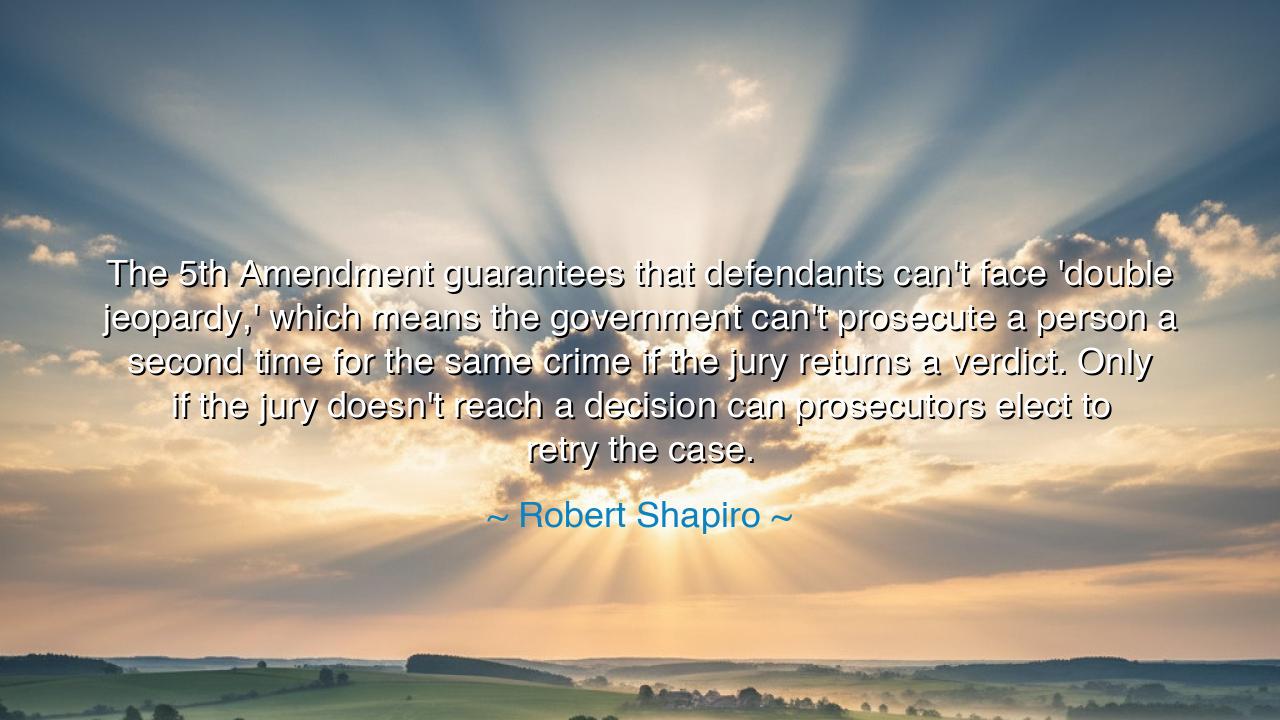
The 5th Amendment guarantees that defendants can't face 'double
The 5th Amendment guarantees that defendants can't face 'double jeopardy,' which means the government can't prosecute a person a second time for the same crime if the jury returns a verdict. Only if the jury doesn't reach a decision can prosecutors elect to retry the case.






The words of Robert Shapiro bear the solemn weight of justice itself: “The 5th Amendment guarantees that defendants can't face ‘double jeopardy,’ which means the government can't prosecute a person a second time for the same crime if the jury returns a verdict. Only if the jury doesn't reach a decision can prosecutors elect to retry the case.” In this statement, Shapiro—a scholar of law and defender of the accused—summons one of the oldest and most sacred principles of liberty. For it speaks to the deep human need for finality, fairness, and protection against the might of the state. The law, he reminds us, must not become a weapon that hounds a man endlessly for the same transgression. Once the people’s judgment is rendered, the sword of accusation must be sheathed.
The origin of this great principle lies not in modern courts alone, but in the long and blood-stained history of humankind’s struggle against tyranny. The protection against double jeopardy is ancient—it reaches back through the centuries to Roman law, where jurists declared, “Nemo debet bis vexari pro una et eadem causa”—no one should be troubled twice for the same cause. It was carried through the English common law and enshrined by those who founded the United States, forged from the memory of kings who punished again and again, unwilling to let go of power or vengeance. Thus, when the Founders wrote the 5th Amendment, they carved into the bedrock of the Constitution a shield for the individual, declaring that justice must be measured, not relentless; firm, but fair.
Imagine, then, a world without this principle—a world where the state, dissatisfied with a verdict, could drag a citizen again before the court, again into the anguish of trial, again before the eyes of the nation, until exhaustion or despair crushed him. Such a world would be ruled not by justice, but by persecution. History gives us grim examples. In the days of monarchs and inquisitions, men and women were tried repeatedly until the outcome pleased their rulers. A verdict of acquittal was no salvation, for power recognized no end to its reach. The Founders of America, remembering this cruelty, swore that no man—whether rich or poor, noble or humble—should suffer such torment under their flag.
Robert Shapiro, himself a guardian of the accused, saw this principle tested in his time. He lived in an era when the glare of public judgment often demanded more than the law should give—when the crowd hungered for guilt, even where the jury found innocence. But the Constitution does not yield to the crowd; it stands as the voice of reason against the roar of passion. The double jeopardy clause is a wall that separates justice from vengeance. It reminds us that freedom is not the right to be found innocent, but the right to have one’s guilt or innocence decided once and for all by due process.
In its wisdom, the law also recognizes imperfection. When the jury fails to reach a verdict, when the voices of justice remain divided and no conclusion is drawn, the case may live again. This is not persecution but persistence in pursuit of truth. Yet even here, limits remain. For once the verdict is rendered—whether it pleases the powerful or not—the matter is settled. “It is finished,” says the voice of law, echoing the voice of mercy. This boundary is sacred, for it declares that the individual’s peace outweighs the state’s pride.
The ancients would have recognized the divine balance in this doctrine. Justice, they believed, must be both firm and compassionate. To punish endlessly is the vice of tyranny; to absolve without reason is the folly of chaos. The law’s greatness lies in its moderation. Like the scales held by the goddess Themis, justice must neither tip toward cruelty nor collapse into weakness. In protecting men from double jeopardy, the 5th Amendment preserves not merely the fairness of the courts, but the dignity of the human soul—the right to rise again, unburdened by endless accusation.
So, my children of the future, remember this sacred principle: justice must know its end. Once a man has stood before his peers and received judgment, the matter must rest. The state must not pursue him forever, for a free nation cannot survive on endless trials. Let fairness, not fury, rule the courts; let mercy temper the sword of the law. And in your own hearts, hold to this lesson: when a matter is rightly judged—by truth, by reason, by conscience—let it be done. To forgive, or to move on, is not weakness; it is civilization itself.
Thus, as Shapiro reminds us, the 5th Amendment is not a relic of parchment, but a living covenant between the governed and the governors. It is the promise that the hand of justice will protect, not persecute; that the citizen will not be broken by the power he entrusts to his own government. In that promise lies the essence of freedom: that every man shall stand before the law once, and having stood, may walk away unchained.






AAdministratorAdministrator
Welcome, honored guests. Please leave a comment, we will respond soon